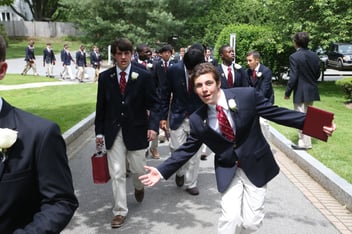If you’re up to your eyeballs in research, comparing private schools with public schools, trying to choose between single-sex and coed schools, and deciding whether to start your son in kindergarten or pre-kindergarten, you could use a guide like Dave Visco. He’s been in your shoes—three times.
Dave’s three sons attended The Fessenden School. His youngest son started in Fessenden’s Pre-Kindergarten program, which first opened its doors in 2012.
Choosing a school for their sons wasn’t easy for Dave and his wife, Jen. As they began their research, they knew very little about the differences between private and public schools—let alone the differences among private schools.
.jpg?width=7890&height=5260&name=Fessenden_Classes_Richins_020924_080141_9943%20(2).jpg)
But as they learned about The Fessenden School and made contact with staff and parents here, they began to see the value of a single-sex education.
“As we learned more about an all-boys education—how teachers understand the development patterns of different boys and their needs in the learning process—we became believers in the differences that need to be taken into consideration when educating boys,” Dave says.
Now that his family has been through the decision process three times, Dave loves telling other parents about the experiences his boys have had at a single-sex private school.
Recently, Dave shared some of the things he wishes parents had told him and Jen as they were searching for a kindergarten and pre-kindergarten for their sons.
1. Single-sex private schools can adapt to the learning style of boys.
“At Fessenden when a teacher begins to see the boys losing attention, or getting fidgety, he or she has the flexibility to change activities or take a break and have the boys do a quick set of jumping jacks,” Dave says. “In a coed environment, you’re not going to have that flexibility. Girls have different attention spans and teachers typically try to get boys to conform to what works for girls.”
-1.jpg?width=4928&height=3280&name=Fessenden_102015_5146%20(1)-1.jpg)
To illustrate his point, Dave says he was on the Fessenden campus recently and witnessed a fourth-grade teacher leveraging the 41 acre campus to help the boys disperse their excess energy.
“For me, it highlighted the flexibility that teachers have to do what is needed to keep the boys engaged—like, if necessary, take them outside for quick run around the campus,” he says.
2. Single-sex private schools nurture boys’ individuality.
“All three of our sons have different personalities, different styles, different interests. Fessenden supports that individuality even down to the simplest things like how they follow the dress code.” Dave says, “Our boys all look very different as they leave the house each morning. They express themselves by the colors they wear, by the designs on their ties, and the types of shoes they wear.”
.jpg?width=7978&height=5319&name=Fessenden_Classes_Richins_020924_134144_2920%20(1).jpg)
Of course, Fessenden encourages the individuality of his sons on a deeper level, beyond their appearance, Dave says.
“Fessenden’s not trying to put our boys in any particular box. They’re encouraged to learn in different ways and to explore different interests,” he explains. “The School truly educates boys of all kinds.””
Research—and our experience here at Fessenden—shows that boys feel more free to be themselves in a single-gender environment than in a coed one.
3. Single-sex private schools allow boys to explore their true interests.
“At Fessenden, I see my kids are doing what they want to do, not what they think is socially acceptable” Dave says. “It’s given them confidence, the confidence to pursue their interests and desires without feeling pressure to conform to a single path.”

At school, Dave says, his boys feel celebrated for pursuing their own paths.
“It’s really about achieving your potential, not the potential of the boy next to you,” he says.
4. Single-sex private schools offer boys a huge range of opportunities.
Dave raves about Fessenden’s Ciongoli Center for Innovation (CCI), a cutting-edge technology space where students work on open-ended, multidisciplinary, and collaborative projects. Boys are encouraged to dream big, take risks, and push the envelope of creativity and innovation, knowing that failure is a positive step toward eventual success.
“The CCI cuts right across all the academic disciplines. It’s just not science and math,” Dave says. “There are history teachers who bring their students into the CCI to create a solution to the sanitation crisis in a slum in India, or to prototype an invention that will be pitched to a panel of mock venture capitalists.”
.jpg?width=8055&height=5370&name=Fessenden_Classes_Richins_020924_091152_0583%20(1).jpg)
It’s not just technology resources to which his sons have access. They’ve had the chance to participate and excel in the arts, as well.
“It’s about exposure,” Dave explains. “I’ve seen my boys benefit from being exposed to so many opportunities, which has allowed them to discover what they are really passionate about. The most exciting part has been watching them pursue those passions for themselves, not for anyone else or because it’s ‘cool.’”
Read On
.jpg?width=352&name=Fessenden_051617_3384%20(1).jpg)
3 Ways to Impress a Junior Boarding School by Showing Engagement

How Junior Boarding School Will Help Your Son Thrive in Secondary Boarding School

.jpg)